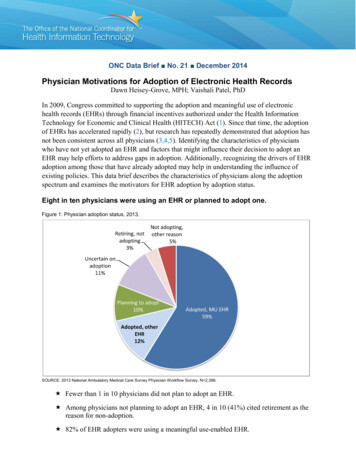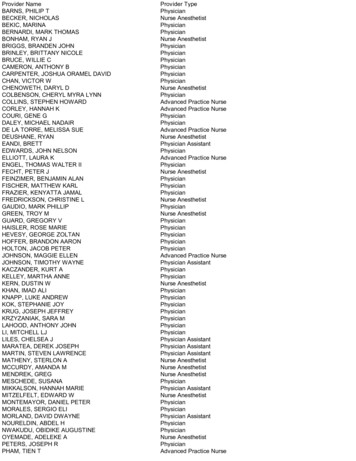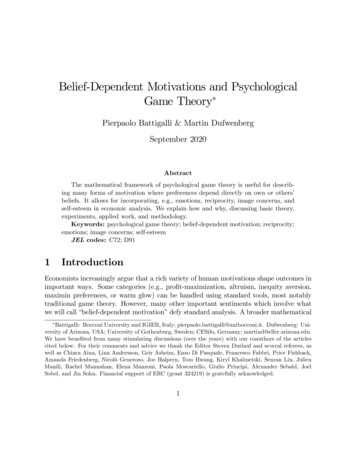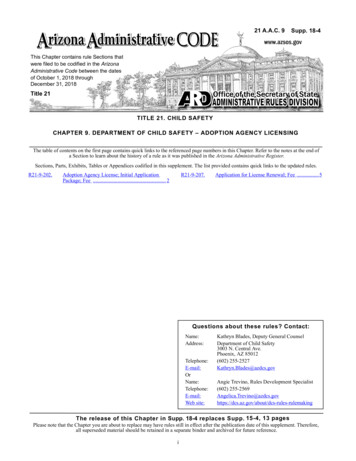
Transcription
ONC Data Brief No. 21 December 2014Physician Motivations for Adoption of Electronic Health RecordsDawn Heisey-Grove, MPH; Vaishali Patel, PhDIn 2009, Congress committed to supporting the adoption and meaningful use of electronichealth records (EHRs) through financial incentives authorized under the Health InformationTechnology for Economic and Clinical Health (HITECH) Act (1). Since that time, the adoptionof EHRs has accelerated rapidly (2), but research has repeatedly demonstrated that adoption hasnot been consistent across all physicians (3,4,5). Identifying the characteristics of physicianswho have not yet adopted an EHR and factors that might influence their decision to adopt anEHR may help efforts to address gaps in adoption. Additionally, recognizing the drivers of EHRadoption among those that have already adopted may help in understanding the influence ofexisting policies. This data brief describes the characteristics of physicians along the adoptionspectrum and examines the motivators for EHR adoption by adoption status.Eight in ten physicians were using an EHR or planned to adopt one.Figure 1: Physician adoption status, 2013.SOURCE: 2013 National Ambulatory Medical Care Survey Physician Workflow Survey. N 2,399. Fewer than 1 in 10 physicians did not plan to adopt an EHR. Among physicians not planning to adopt an EHR, 4 in 10 (41%) cited retirement as thereason for non-adoption. 82% of EHR adopters were using a meaningful use-enabled EHR.
Solo practice physicians had the highest percentage of providers who wereuncertain on adoption or who never planned to adopt.Figure 2: Characteristics of physicians by EHR adoption status, 2013.SOURCE: 2013 National Ambulatory Medical Care Survey Physician Workflow Survey. N 2,399. Physicians in large and multi-specialty practices had the lowest rates of physiciansreporting they would never adopt an EHR. Solo practice physicians had the highest percentage of physicians who were uncertainabout their EHR adoption plans and physicians who did not plan to adopt an EHR. Among specialty types, surgical specialists had the highest rate of physicians who neverplanned to adopt an EHR (9%). No differences were observed between physicians in rural and urban areas.ONC Data Brief No. 21 Physician Motivations for Adoption of Electronic Health Records2
A majority of physicians who adopted an EHR between 2010 and 2013 reportedthat financial incentives or penalties had a major influence in their decision toadopt EHRs.Figure 3: Major influences in the decision to adopt an EHR among physicians who had adopted EHRs by whetherthey adopted EHR pre or post-HITECH (2009), 2011-2013.SOURCE: 2013 National Ambulatory Medical Care Survey Physician Workflow Survey. N 1,517. A larger proportion (62%) of physicians who adopted post-HITECH reported thatfinancial incentives or penalties were major influences on their decision to adopt anEHR compared to those who adopted prior to 2009. Physicians in both groups identified the ability to electronically exchange healthinformation with other providers as a major motivation for adoption: this was theleading reason for physicians who adopted before HITECH, and 36% of physicians whoadopted after HITECH passage. The second most common motivation for EHR adoption among physicians who adoptedafter HITECH implementation was requirements for board certification.ONC Data Brief No. 21 Physician Motivations for Adoption of Electronic Health Records3
Incentive payments, financial penalties, and technical assistance would bepotential drivers for EHR adoption among physicians not using EHRs.Figure 4: Major drivers for adoption among physicians who had not adopted EHRs, 2013.NOTES: Excludes physicians who cited retirement as their reason for not adopting an EHRSOURCE: 2013 National Ambulatory Medical Care Survey Physician Workflow Survey. N 454. Availability of incentive payments or financial penalties would be major influences onthe decision to adopt an EHR for more than half of physicians not using an EHR. More than 4 in 10 physicians who had not adopted an EHR reported that access totechnical assistance around EHR implementation would be a major influence in theirdecision to adopt. Forty-four percent of physicians who had not adopted an EHR reported that a boardcertification requirement would be a major influence to adopt an EHR. Almost 4 in 10 physicians not using an EHR said that the ability to electronicallyexchange health information with other providers would majorly influence their decisionto adopt an EHR.ONC Data Brief No. 21 Physician Motivations for Adoption of Electronic Health Records4
One in three physicians who had not adopted indicated they had applied, orplanned to apply, for incentive funds.Figure 5: EHR Incentive Program application status among physicians who had not adopted an EHR, 2013.NOTES Excludes physicians who cited retirement as their reason for not adopting an EHR, and physicians who did not respond to the question.SOURCE: 2013 National Ambulatory Medical Care Survey Physician Workflow Survey. N 451. One-third of physicians who had not adopted an EHR had applied or planned to applyfor incentive funds. Almost 3 in 10 non-adopter physicians had no plans to apply for incentive payments. Ten percent of physicians who had not adopted an EHR were not eligible for the EHRIncentive Program.ONC Data Brief No. 21 Physician Motivations for Adoption of Electronic Health Records5
More than 6 in 10 physicians who reported they would not adopt an EHR citedlack of resources as the reason.Figure 6: Reasons cited by physicians who did not plan to adopt an EHR, 2013.NOTES Excludes physicians who cited retirement as their reason for not adopting an EHR.SOURCE: 2013 National Ambulatory Medical Care Survey Physician Workflow Survey. N 111. More than half of all physicians who planned to never adopt an EHR cited a lack offinancial resources as a reason for the decision. Physicians who planned never to adopt also cited other resource-based reasons for thatdecision: 48% cited a lack of time and 40% cited a lack of staff. Four in ten physicians who planned to never adopt an EHR indicated that privacy andsecurity concerns contributed to the decision to not adopt. Two in ten physicians reported that they would not adopt an EHR because no EHRsystem fit the needs of their specialty.ONC Data Brief No. 21 Physician Motivations for Adoption of Electronic Health Records6
SummaryMost physicians—8 in 10 — either planned to adopt, or have already adopted, an EHR. Consistentwith prior studies, however, the data presented here show variation in EHR adoption rates acrossdifferent physician groups. We found high adoption rates among large and multi-specialty practicephysicians and much lower adoption rates among solo and small practice physicians. Moresignificantly, we found that physicians working as solo practitioners or in small practices had thelargest percentages of physicians who reported they were either uncertain or did not plan to adopt anEHR. Therefore, narrowing the EHR adoption gap overall will involve continuing to focus efforts onthese physicians.Comparing drivers for EHR adoption among physicians who had not adopted to physicians whoadopted at different adoption policy stages shows the important role that financial incentives hasplayed among EHR adopters post-HITECH and could play among those who have yet to adopt anEHR. There was a clear difference in the influence of financial incentives and payments amongphysicians who adopted prior to HITECH passage and after: a majority (62%) of physicians whoadopted between 2010 and 2013 reported that financial incentives and penalties played a significantrole in their decision to adopt an EHR, compared with 23% of physicians who adopted an EHRbefore HITECH. In addition, more than a third of physicians who had not adopted an EHR had, orplanned to apply for incentive funds, indicating a clear plan to adopt and EHR. Such incentives andpenalties would be a major influence in a decision to adopt an EHR among physicians who were notusing one, yet 10% of physicians not using an EHR were not eligible for an incentive paymentthrough CMS’ EHR Incentive Program. Moreover, a majority of physicians who did not plan toadopt an EHR also cited a lack of financial resources as the reason for that decision. These findingare consistent with prior analyses that indicate financial incentives or penalties are more influentialamong non-adopters and recent adopters compared to early adopters of EHRs (6).Another major influence in the decision to adopt was the availability of technical assistance withEHR implementation. More than a third of physicians who adopted between 2010 and 2013 reportedthat the availability of technical assistance was a major influence in their decision to adopt an EHR.Among non-adopters, however, the need for technical assistance was higher: 46% of physicians whohad not adopted an EHR said that technical assistance would be a major influence in any decision toadopt the technology. Furthermore, at least 40% of physicians who reported they did not plan toadopt an EHR cited reasons that could be mitigated through the availability of technical assistance:lack of staffing and the time needed to implement.Of note, more than a third of both adopters and non-adopters reported that the ability to electronicallyexchange patient health information with other providers was, or would be, a major influence in anydecision regarding EHR adoption. To ensure that physicians have enough trading partners withwhom to safely and securely exchange information, adoption must be high across all providergroups. These data demonstrate, however, that although there were high adoption rates amongprimary care physicians, similar rates were not observed across other specialty groups. Almost 10%of surgical specialists reported they would never adopt an EHR. To ensure improved patient care,reduced health care costs, and improved continuity of care across the health care continuum,physicians across the spectrum must adopt EHRs and use them to safely and securely share patienthealth information electronically.ONC Data Brief No. 21 Physician Motivations for Adoption of Electronic Health Records7
DefinitionsAdopted MU EHR (“meaningful use enabled EHR”): Physician indicated in the survey that s/hehad adopted EHR technology, and in response to the question, “Does your current system meetmeaningful use criteria as defined by the Department of Health and Human Services (HHS)?”,selected “Yes”. (referring to the CMS EHR Incentive Program) (7).Adopted, other EHR: Physician indicated in the survey that s/he had adopted EHR technology,and in response to the question, “Does your current system meet meaningful use criteria asdefined by the Department of Health and Human Services (HHS)?”, did not select “Yes”.Planning to adopt: Physician indicated in the survey that s/he did not adopt an EHR and inresponse to the question, “Do you ever plan to implement an EHR system?”, responded with“Yes”.Uncertain on adopting: Physician indicated in the survey that s/he did not adopt an EHR and inresponse to the question, “Do you ever plan to implement an EHR system?”, responded witheither “Uncertain because not involved in the decision making process”, “Uncertain becauseundecided”, or left the question blank.Not adopting, retiring: Physician indicated in the survey that s/he did not adopt an EHR and inresponse to the question, “Why do you not plan on implementing an EHR system”, selected“Plan to retire soon”.Not eligible: Physician indicated in the survey that s/he did not adopt an EHR, and would notapply for the Incentive Program, citing “Not qualified as an “eligible provider”” as the reason.Data Source and MethodsThe Centers for Disease Control and Prevention conducts the NAMCS survey on an annualbasis. The 2011-2013 Physician Workflow Surveys, which is the basis of the data presented here,are supplements to the 2011 NAMCS survey. The survey examines the attitudes and experienceswith EHRs among a longitudinal cohort survey of a subsample of physicians eligible for the2011 NAMCS survey. Physicians included in this survey provide direct patient care in officebased practices and community health centers; excluded are those without direct patient care(radiologists, anesthesiologists, and pathologists). Additional documentation regarding thesurvey is available here: http://www.cdc.gov/nchs/ahcd/ahcd survey instruments.htmFindings are based upon univariate and bivariate analyses performed in SAS v9 using procsurveyfreq, and estimates reflected weighted national estimates. Questions used from thesurvey to assess are listed in Table A1.ONC Data Brief No. 21 Physician Motivations for Adoption of Electronic Health Records8
References1. Health Information Technologys for Economic and Clinical Health (HITECH) Act, TitleXIII of Division A and Title IV of Division B of the American Recovery andReinvestment Act of 2009 (ARRA). (February 17, 2009). Pub. L. No 111-5.2. Hsiao, C.-J., & Hing, E. (2014). Use and characteristics of electronic health recordsystems among office-based physician practices: United States, 2001–2013. NCHS databrief, no 143. .3. Furukawa, M. F., King, J., Patel, V., Hsiao, C.-J., Adler-Milstein, J., & Jha, A. K. (2014).Despite Substantial Progress In EHR adoption, Health Information Exchange and PatientEngagement Remain Low in Office Settings. Health Affairs, 33(9), 1672-16794. Sowmya, R. R., DesRoches, C. M., Donelan, K., Campbell, E. G., Miralles, P. D., & Jha,A. K. (2011). Electronic health records in small physician practices: availability, use, andperceived benefits. J Am Med Inform Assoc, 18, 271-275.5. Xierali, I. M., Phillips, R. L., Green, L. A., Bazemore, A. W., & Puffer, J. C. (2013,August). Factors influencing family physician adoption of electronic health records(EHRs). Journal of the American Board of Family Medicine, 26(4), 399-393.6. Jamoom E, Patel V, Furukawa M, King J. (2014). EHR adopters vs. non-adopters:Impacts of, barriers to, and federal initiatives for EHR adoption. Healthcare, 2,33-39.7. Centers for Medicare and Medicaid Services. (2010). Medicare and Medicaid ElectronicHealth Record Incentive Program – stage 1 final rule: 42 CFR parts 412, 413, 422, and495. Federal Register.About the AuthorsThe authors are with the Office of the National Coordinator for Health Information Technology,Office of Planning, Evaluation, and Analysis.Suggested CitationHeisey-Grove, D., Patel, V. (December 2014) Physician Motivations for Adoption of ElectronicHealth Records. ONC Data Brief, no. 21. Office of the National Coordinator for HealthInformation Technology: Washington DC.ONC Data Brief No. 21 Physician Motivations for Adoption of Electronic Health Records9
AppendixTable A1: Selected questions used from the 2011-2013 National Ambulatory Medical Care Survey, PhysicianWorkflow SurveySurvey QuestionWhich of the following bestdescribes the reporting location’scurrent EHR adoption status?For adopter influences:How much of an influence didthe following have on yourdecision to adopt an EHRsystem?For Non-adopter influences:How much of an influence do youthink the following would haveon your decision to adopt an EHRsystem?Why do you not plan onimplementing an EHR system?CHECK ALL THAT APPLY.Medicare and Medicaid offerincentives to practices thatdemonstrate “meaningful use ofhealth IT.” At the reportinglocation, are there plans to applyfor these incentive payments?Available ResponsesWe are actively using an EHRsystem that was installed morethan 12 months ago.We are actively using an EHRsystem that was installed withinthe past 12 monthsWe are not actively using an EHRsystem but have one installedWe do not have an EHR SystemMajor Influence to AdoptMinor Influence to AdoptMinor Influence to AdoptAnalytic ClassificationAdoptedNot AdoptedMajor influencen/an/aMajor Influence to AdoptMinor Influence to AdoptNot an InfluenceMajor influencen/an/aNo systems fit with my specialtyPlan to retireLack of timeLack of staffLack of financial resourcesPrivacy/security concernsOtherYes, we already appliedYes, we intend to applyNo, we will not applyUncertain if we will apply becauseI’m not involved in the decisionprocessUncertain if we will apply becauseI’m undecidedn/aRetiringn/an/an/an/an/aApplied or will applyApplied or will applyWill not applyUndecided or uncertain ofapplication decisionAdoptedNot AdoptedUndecided or uncertain ofapplication decisionSOURCE: 2011-2013 National Ambulatory Medical Care Survey Physician Workflow Survey.ONC Data Brief No. 21 Physician Motivations for Adoption of Electronic Health Records10
A majority of physicians who adopted an EHR between 2010 and 2013 reported that financial incentives or penalties had a major influence in their decision to adopt EHRs. Figure 3: Major influences in the decision to adopt an EHR among physicians who had adopted EHRs by whether they adopted EHR pre or post-HITECH (2009), 2011-2013.











